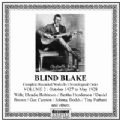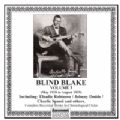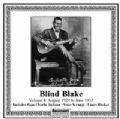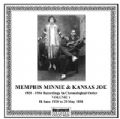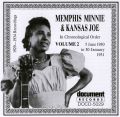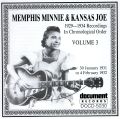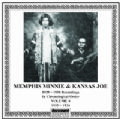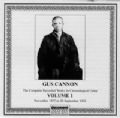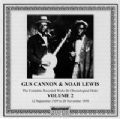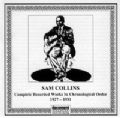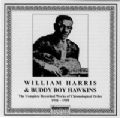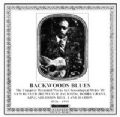"Document 5000 Series "
Viewing 25 to 36 of 700
|
Blind Blake Vol 2 1927 - 1928 Blind Blake Vol 2 (October 1927 to May 1928)
Blind Blake, vocal, guitar, piano, possibly harmonica, whistle.
With contributions by: Gus Cannon, banjo; Johnny Dodds, clarinet; Jimmy Bertrand, slide whistle, xylophone; Elzadie Robinson, vocal; Bertha Henderson, vocal; Tiny Parham, piano, Daniel Brown, vocal; And others…
Genres: Ragtime Guitar, Country Blues Guitar.
Informative booklet notes by Alan Balfour.
Detailed discography.
It is Blake’s guitar playing abilities though that gives him his place in the development of a style that commentators now classify as “ragtime guitar”. A dazzling display of this technique can be heard on Southern Rag, a number which hints at his background and perhaps his influences. Accompanying himself with a series of chord changes and alternating thumbed bases he begins a spoken commentary which suddenly moves into the vernacular of the Gullah and Geechie peoples of the Georgia Sea Island, underpinned by a demonstration of an African rhythm on his guitar (“I’m goin’ to give you some music they call the Geechie music now”), finally lapsing back into his usual speech patterns. Continued... More Info on our New Store >> |
||
|
Blind Blake Vol 3 1928 - 1929 Blind Blake, vocal, guitar.
With contributions by; Elzadie Robinson, vocal, Charlie Spand, piano, Jimmy Bertrand, xylophone.
Genre: Country Blues, Ragtime Guitar, Blues Guitar
Informative booklet notes by Alan Balfour Includes detailed discography.
From this CD's booklet notes: By 1928 Blind Blake had gathered a faithful following, his appeal probably being due to the scope of his material, his popularity rivalling that of Blind Lemon Jefferson. The third volume in the series opens featuring Blind Blake in the role of sideman, lending his brilliant guitar leads in support of Elzadie Robinson on "Elzadie's Policy Blues" and "Pay Day Daddy Blues." Returning to recording under his own name, a session, or sessions, held during September 1928 seemed to find Blake obsessed by women and the problems they were causing him, at times sounding lachrymal and despondent “Search Warrant”, “Back Door”, desperate “Walkin’ Across The Country” and positively violent as in “Notoriety Woman”, “To keep her quiet I knocked her teeth out her mouth, that notoriety woman is known all over the south”. The final number recorded that month, “Sweet Papa Low Down”, with its cornet, piano and xylophone accompaniment, evoke the kind of bouncy tune popular with practitioners of the Charleston dance craze. It was to be a further nine months before Blake recorded again, this time in company with pianist Alex Robinson. The five titles cut were of a far less suicidal nature than previous and on one number in particular, “Doin’ A Stretch”, his approach owed much to the style of Leroy Carr. More Info on our New Store >> |
||
|
Blind Blake Vol 4 1929 - 1932 Blind Blake Vol 4 (August 1929 to June 1932)
Blind Blake, vocal, guitar.
With contributions by Papa Charlie Jackson, banjo; Irene Scruggs, vocal; and others...
Genres: Ragtime Guitar, Country Blues Guitar.
Informative booklet notes by Alan Balfour.
Detailed discography.
From this album's booklet notes:
Despite the name of Blind Arthur being used for two guitar solos recorded in October 1929, there can be little doubt that it is Blind Blake who is playing his "famous piano-sounding guitar" (to quote a Paramount advertisement) on Guitar Chimes. It has the same use of harmonics as in 'Police Dog Blues' (DOCD-5026) but played in the key of C and latterly commented on by a noted musicologist thus, "most country blues guitarists were not sufficiently well versed in C to have hazarded such an instrumental". Continued... More Info on our New Store >> |
||
|
Memphis Minnie & Kansas Joe Vol 1 1929 - 1930 Kansas Joe (Joe McCoy), vocal, guitar.
Memphis Minnie, vocal guitar.
With contributions by: Memphis Jug Band: Will Shade, harmonica; Charlie Burse, guitar; Hambone Lewis, jug.
Genres: Country Blues, Memphis Blues, Country Blues Guitar.
Informative booklet notes by Alan Balfour.
Detailed discography.
From this albums booklet notes:
Recording as "Kansas Joe" and "Memphis Minnie" at their 1929 debut recording session the couple cut six numbers, three featuring Kansas Joe as a vocalist, two with Minnie taking the vocals and the third found them duetting. These recordings weren't afforded immediate issue but were released over a period of time. For example, the coupling Bumble Bee / I Want That was not on sale until some fifteen months later. It was to be the suggestive "Bumble Bee" ("Got the best stinger I've ever seen") that was to make Memphis Minnie. So successful was the song that Victor "borrowed" Minnie to record a version fronting a caucus of the Memphis Jug Band. Vocalion then responded with Bumble Bee No. 2 and New Bumble Bee. The song was such hot property on the race market that in the last six months of 1930, unreleased recordings apart, there were no fewer than five versions, on three different labels, of "Bumble Bee" — three of which are present on this compilation. Continued...
More Info on our New Store >> |
||
|
Memphis Minnie & Kansas Joe Vol 2 1930 - 1931 Memphis Minnie, vocal, guitar; Kansas Joe McCoy, vocal, guitar.
Genres: Memphis Country Blues, Country Blues Guitar.
Informative booklet notes by Alan Balfour.
Detailed discography.
From this album's booklet notes:
This compilation represents Memphis Minnie and Kansas Joe’s first encounter with the Chicago. Between June 1930 and January l931 the pair recorded on several occasions and cut several dozen titles. However, as a result of America's slide into depression, most songs took many months to release and with the exception of the coupling, "I Don't Want No Woman I Have To Give My Money To" / Cherry Ball Blues, nearly all songs recorded during June were left on the shelf. Subsequently they were issued with items from later sessions. Vocalion's follow-up release, What's The Matter With The Mill / North Memphis Blues, didn't appear until November featuring titles recorded in October, the former ostensibly about a broken down corn mill but in reality sexual innuendo and the latter, apparently in praise of the culinary delights to be found at a Memphis cafe, is thought by some commentators to concern a house of ill repute! Continued... More Info on our New Store >> |
||
|
Memphis Minnie & Kansas Joe Vol 3 1931 - 1932 Memphis Minnie, vocal, guitar, bottleneck-slide guitar, Kansas Koe McCoy, vocal, guitar, mandolin.
Genres: Memphis Country Blues, Country Blues Guitar, Country Blues Mandolin.
Informative booklet notes by Alan Balfour.
Detailed discography.
From this album’s booklet notes:
At the dawn of 1931 sales of race records were in sharp decline. Companies who six months previously had pressed in the region of 2,000 copies per record had cut that almost by half. Industry figures of the time showed that race records only accounted for about one percent of total sales, a very significant drop from the previous year. It was in this climate, and the period covered by this compilation, that Memphis Minnie and Kansas Joe continued to record. A measure of the seriousness of the situation as it affected them can probably be gauged by their output; barely thirty titles recorded, at least half a dozen of which never saw release. Despite all this the quality of their recordings didn't appear to suffer and, if anything, seemed to draw from Minnie a renewed sense of personal intensity both in lyric and playing. More Info on our New Store >> |
||
|
Memphis Minnie & Kansas Joe Vol 4 1933 - 1934 Memphis Minnie, vocal, guitar; Kansas Joe McCoy, vocal, guitar.
With contributions by: Charlie McCoy, guitar; and others…
Genres: Memphis Country Blues. Country Blues Guitar.
Informative booklet notes by Alan Balfour.
Detailed discography.
From this album's booklet notes:
After a gap of almost two years Memphis Minnie returned to the studio in November 1933 but this time it was as a solo artist. The session only produced four numbers of which two were commercially released. My Butcher Man, a double-entendre employing some nice 'meat cutting' imagery ("slice my pork chop, grind my sausage too" etc) and culminating in the vivid, "if anybody ask you "butcher man where you bin?", show them that long bladed knife, tell 'em you've bin butchering out in that slaughter pen" was coupled with the outstanding, Too Late, a blues that in structure and attack owed more to Mississippi than Memphis or Chicago, the superb guitar accompaniment so reminiscent of Mattie Delaney. Continued... More Info on our New Store >> |
||
|
Gus Cannon Vol 1 1927 - 1928 Gus Cannon (Banjo Joe), vocal, banjo, speech, whistling, kazoo.
With contributions from:
Cannon’s Jug Stompers. Including: Gus Cannon, vocal, banjo, jug, Ashley Thompson, vocal, guitar; Noah Lewis, harmonica; Elijah Avery, banjo, guitar, kazoo, Hosea Woods, kazoo.
Blind Blake, guitar.
Gus Cannon was already in his mid-forties when he came to record in 1927, so it's not surprising that at his first sessions he cut Poor Boy, Long Ways From Home, one of the earliest blues, setting it to a unique slide banjo accompaniment. His sessions as "Banjo Toe" also featured ragtime pieces and medicine show songs, among them the once-typical Can You Blame The Colored Man, a funny,albeitsomewhat Uncle Tommish, song about Booker T. Washington's 1901 visit to the White House. Blind Blake, who helped out with second guitar on most titles, was added at Paramount’s behest; they had never met before the session. Continued... More Info on our New Store >> |
||
|
Gus Cannon & Noah Lewis Vol 2 1929 -1930 Cannon And Woods (The Beale Street Boys); Gus Cannon vocal, banjo; Hosea Woods, vocal, guitar.
Cannon's Jug Stompers; Gus Cannon, vocal, banjo, jug; Hosea Woods, vocal, banjo; Noah Lewis, vocal, harmonica.
Noah Lewis, harmonica solo.
Noah Lewis' Jug Band; Noah lewis, vocal, harmonica; Sleepy John Estes, guitar; Yank Rachel, mandolin; Ham Lewis, jug. Mrs Van Zula Carter Hunt, vocal.
Genres; Blues, Memphis Blues, Country Blues, Jug Band, Blues Banjo, Blues Harmonica.
Informative booklet notes by Chris Smith.
Detailed discography.
From this album's booklet notes:
After Cannon's Jug Stompers recorded in September 1928 (see Document DOCD-5032) it was about a year before Gus next faced the mikes; when he did, it was as one half of "Cannon And Woods" (The Beale Street Boys)", making a disc for Brunswick in breach of his contract with Victor. "Woods" was Hosea Woods, older even than Gus, a splendid singer with a strong falsetto, and about to replace Elijah Avery as the Stompers' second banjoist and guitarist. Gus Cannon is said to play guitar on the Beale Street Boys sides, but as the instruction to "Percolate that banjo!" is given to "Joe" (i.e. Banjo Joe), it seems more likely that Woods is the guitarist. Continued... More Info on our New Store >> |
||
|
Sam Collins - Complete Recorded Titles - 1927 - 1931 Sam Collins, vocal, guitar, bottleneck-slide guitar.
With contributions by: John D. Fox, vocal.
Genres; Country Blues, Mississippi Blues, Country Blues Guitar, Bottleneck-slide Guitar. Informative booklet notes by Keith Briggs. Detailed discography.
From this album's booklet notes: Sam Collins, "Salty Dog Sam", was something of an enigma to record collectors in the late fifties and early sixties. The bulk of the known facts regarding Sam Collins' life are the results of field work undertaken by American collector Gayle Dean Wardlow. It was discovered that Collins was raised in McComb, Mississippi, birth-place of another, later, innovator, Bo Diddley. Despite its location in the Sunflower state, McComb was just across the line from Louisiana and it was in that state that Sam was born to Sam Sr. and Sophie in August 1887. By the time he had reached maturity he was carrying his music to the barrelhouses in an area that covered both states. This stamping-ground seems to have overlapped one being worked by Joe Holmes, a son of McComb who relocated in Sibley, Louisiana, because the two men formed one of those loose partnerships that we hear of so often in blues history. Maybe they knew each other from McComb, before Holmes moved to Louisiana. Joe was only to record once; for Paramount in 1932, two years after Sam's last session - and under the name "King Solomon Hill".
The result of all this cross-fertilisation is to be heard on the disc now before you. By accepted standards Sam's limited slide guitar work is often out of tune. Out of tune to our ears that is but not to Sam's because it fits perfectly with a voice employing what is often described as an "eerie" falsetto to earn its owner the nom du disque "Crying" Sam Collins. Continued... More Info on our New Store >> |
||
|
William Harris & Buddy Boy Hawkins 1927 - 1929 Walter “Buddy Boy” Hawkins, vocal, guitar.
William Harris, vocal, guitar.
With contribuions by Joe Robinson, guitar, speech and possibly Charlie Patton, vocal comments.
Genres: Country Blues, Country Blues guitar.
Informative booklet notes by Paul Oliver Detailed discography. From this album's booklet notes:
Nothing is known about William Harris and Buddy Boy Hawkins as individuals, and field research has uncovered almost no details of their lives; what we know of them is a fragment of information or two, and the rest has to be deduced from their songs. From the evidence of his guitar style, with its emphasis on rhythmic complexity rather than on single-string work, William Harris may have come from the Mississippi Delta. More Info on our New Store >> |
||
|
Backwoods Blues 1926 - 1935 Bo Weavil Jackson (Sam Butler), vocal guitar. Bobby Grant, vocal, guitar. King Solomon Hill, vocal guitar, Lane Hardin, vocal, guitar
Genres: Country Blues; Alabama, Mississippi, Texas Blues Guitar including Bottleneck Slide Guitar. Informative booklet notes by Paul Oliver. Includes detailed discography.
Beyond the few metalled highways in the South of six decades ago the dirt roads wound through the country, linking the settlements and farm communities of the backwoods. Some farms were literally in the woods, established in the untidily cleared forest. But the term "backwoods" was loosely applied to any isolated settlement where few people had any experience of the larger world of the Southern cities. In most communities though, there were musicians who played for dances or at the roadside jukes, and a number of them gained a more than local reputation. Some, more adventurous than their companions, went "down the dirt road" to try their luck in town. Continued... More Info on our New Store >> |
||

